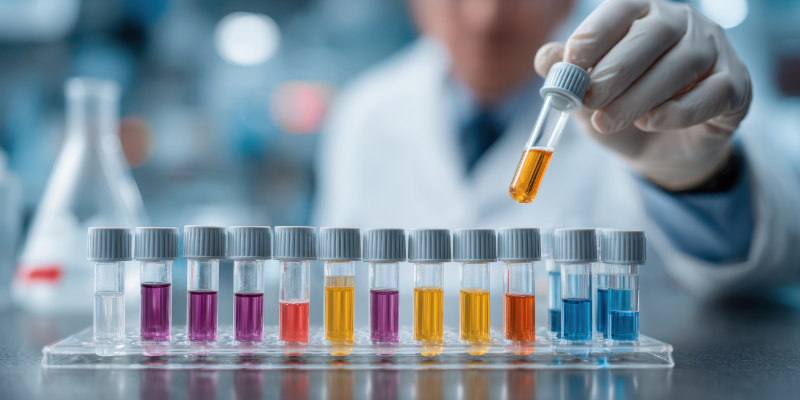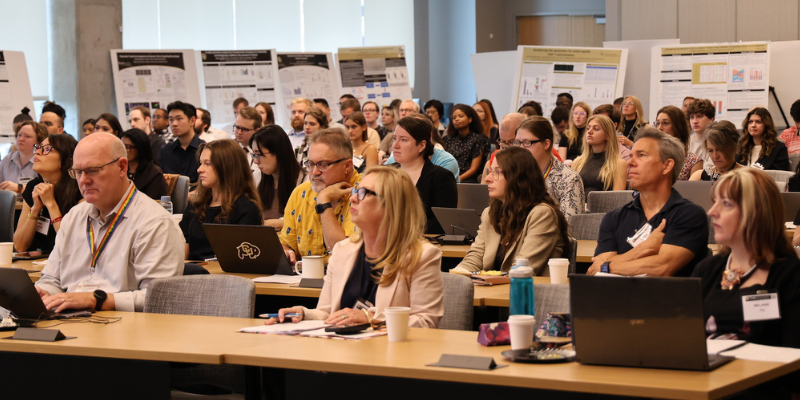Is there a way to reduce the time spent in trialing different medications, such as antidepressants? Is there a way to predict who may be at increased risk of experiencing medication side effects?
 This calls for personalized medicine, which is more than a buzzword. Pharmacogenomics, a subset of personalized medicine, is an exciting field of medicine dedicated to understanding how a person’s genes affect his/her drug response. It can potentially help patients know which drugs will more likely work for them, and reduce the frustration behind the trial and error approach to medicine. At the University of Colorado (CU) Skaggs School of Pharmacy and Pharmaceutical Sciences, assistant professor Yee Ming Lee PharmD, BCPS, ABCP, is focused on bringing pharmacogenomics into clinical practice to impact patient outcomes.
This calls for personalized medicine, which is more than a buzzword. Pharmacogenomics, a subset of personalized medicine, is an exciting field of medicine dedicated to understanding how a person’s genes affect his/her drug response. It can potentially help patients know which drugs will more likely work for them, and reduce the frustration behind the trial and error approach to medicine. At the University of Colorado (CU) Skaggs School of Pharmacy and Pharmaceutical Sciences, assistant professor Yee Ming Lee PharmD, BCPS, ABCP, is focused on bringing pharmacogenomics into clinical practice to impact patient outcomes.
“The current (prescribing) process assumes a one-size-fits-all approach,” Lee said. “We are looking at individual factors such as genetics to understand how it can affect a person’s drug response.”
Dr. Lee, along with clinical pharmacogenomics fellow and CU Pharmacy alumnus James Martin, PharmD, ’20, offer a pharmacist-provided pharmacogenomic service at the University of Colorado Hospital (UCH) Patient Coordinated Services Clinic. Providers at the clinic refer patients looking to understand if there is a genetic cause to the medication side effects they have experienced, patients who have failed multiple medications and hope to find the right medication, and patients who just want to know their genetic profile in relation to drug response. This service, established in 2018, has seen about 25 patients since that time.

Dr. Yee Ming Lee, associate professor, pharmacogenetics expert |
Dr. Lee emphasizes that many factors affect an individual’s drug response, including genetics, environment, and lifestyle. However, our genetics do not change. Even though the pharmacogenomic test is typically paid out-of-pocket, there is usually no need to repeat the test. Genetic results may be applied to certain drugs prescribed in the future, including new drugs under development. As such, there are many opportunities to personalize treatment plans for patients based on their genetic profiles.
Before patients get tested, Drs. Lee and Martin explain to them the benefits and limitations of pharmacogenomic testing. Some of the benefits include using the results to inform providers which drug to use, how much to prescribe, and who is at risk of side effects and/or toxicity.
According to Dr. Martin, though they see patients seeking help with mental health-related medications, pharmacogenomics is also widely applied in other areas of medicine, including cardiology, gastroenterology, infectious disease, neurology, oncology, and pain management.
The pharmacogenomic test involves a simple cheek swab that is sent off for DNA testing. Drs. Lee and Martin then gather the patient’s medical history, current medication list, and information on previous medications tried. Once the patient’s pharmacogenomic results are available, they will discuss the findings with the referring physician and come up with a treatment plan. The clinical use of pharmacogenomic results has been facilitated by pharmacogenomic guidelines produced by organizations such as the Clinical Pharmacogenetics Implementation Consortium.
Dr. Lee is being realistic, but also modest. Her role as a pharmacist in this field is invaluable, and she and Dr. Martin have the specialized training to not only interpret genetic test results, but explain why the patient may or may not be reacting as expected to treatment, and what are the alternative drugs to consider.
the specialized training to not only interpret genetic test results, but explain why the patient may or may not be reacting as expected to treatment, and what are the alternative drugs to consider.
They encountered one patient in particular with a history of side effects to multiple drugs, who was frustrated after trying over twenty different medications and dosages to treat hypertension. This patient had pharmacogenetic testing done outside UCHealth but was not counseled on the results or how they fit in her treatment plan. When the patient met Drs. Lee and Martin, she was delighted to see how they utilized her pharmacogenomic results, performed a comprehensive medication review, and developed a treatment plan that reduced her long list of medications and helped manage her hypertension and other medical conditions. Both Drs. Lee and Martin also provided a personalized pharmacogenomics report for her providers that described future medications that would be most likely, and least likely to work based on the patient’s genetic results.
With the widespread availability of genetic testing and interest in personalized medicine, Dr. Lee sees this field as a world of opportunities.
“People are curious about their genome, they want to know where they came from, and (pharmacogenomics) is playing an important role in our medical practice,” she said.
With the increase in genetic testing, Congress passed the Genetic Information Nondiscrimination Act (GINA) in 2008 that prohibits genetic discrimination in health insurance and employment. Under GINA, it is illegal for health insurers to require or use genetic information to make decisions about a patient’s insurance eligibility or coverage, and it is illegal for employers to use genetic information to make decisions about hiring, promotion, and other terms of employment.
“People do worry that this test will subject them to genetic discrimination, and we can tell them that is not the case for health insurance and employment,” Lee said.

Dr. James Martin, clinical pharmacogenomics fellow |
As for Dr. Martin, his role as a clinical pharmacogenomics fellow in a rapidly advancing field keeps him on his toes. He is a postdoctoral fellow working under Drs. Christina Aquilante, PharmD, FCCP (Professor, Department of Pharmaceutical Sciences) and Lee, and has been exposed to a broad variety of activities related to pharmacogenomics.
As part of his fellowship, Dr. Martin participates in teaching the pharmacogenomics course with Drs. Aquilante and Lee to entry-level PharmD students at the CU Skaggs School of Pharmacy and Pharmaceutical Sciences. For other healthcare professionals wishing to learn more about pharmacogenomics, Dr. Aquilante also teaches a pharmacogenomics continuing education certificate program that is offered by the School of Pharmacy and the College of Nursing. This 8-week online course is a practice-based, interactive program that provides pharmacists and other health care providers with an understanding of the fundamentals and clinical applications of pharmacogenomics and personalized medicine.
Dr. Martin shares the goal of bringing genetic testing to a clinical setting, something he sees as the future of healthcare.
“If we can bring this technology to more people and train more healthcare professionals on how to use this information, we will be much closer to realizing a more personalized approach to medicine. Patients may not need to be so frustrated with the trial-and-error method of having their medication prescribed,” he said. “This is the future of personalized, more accurate, treatment.”



